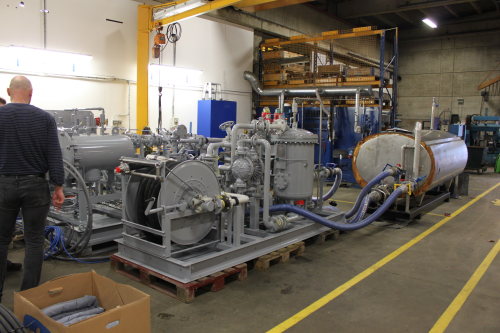
DESMI participated in the tender process from the very beginning and had an open and honest dialogue with both the designer, shipyard, and the end user and their technical support to make sure that the technical solution was 100% fit for purpose.
.jpg) 3D animated picture of MARS Tanker during replenishment at sea (RAS) operation using DESMI cargo pumps.
3D animated picture of MARS Tanker during replenishment at sea (RAS) operation using DESMI cargo pumps.
By the end of the tender period, DESMI won the contract for the following systems
- All centrifugal pumps required for installation in the engine room including shock rated pumps.
- All the helicopter refuelling systems for refuelling the helicopter on deck and in flight.
- All cargo pumps designed for handling both aviation fuel and marine diesel fuel.
- Emergency fire pump, diesel engine driven.
The centrifugal pump package for these vessels includes pumps for cooling systems, pumps for ballast systems, fire systems, chilled and hot water systems, all in ductile material, namely nodular cast iron for freshwater applications and nickel-aluminium-bronze for seawater applications. All pumps supplied are fitted with ABB electrical motors which are manufactured to naval standards.
.JPG) Water cooled electrical motors and gas tight deck penetrations which is the top part of the cargo pump installation.
Water cooled electrical motors and gas tight deck penetrations which is the top part of the cargo pump installation.
The helicopter refuelling systems consist of two units: In the ship’s hull, the pump and filtration system is placed, which will serve the purpose of transferring and filtering the aviation fuel when being pumped from one tank to the other, or from the tank and up into the dispensing system, which is placed in the hanger on board the vessels. The dispensing system in the hanger will be connected by a hose to the helicopter. During refuelling the volume of fuel is measured, and the supply pressure is controlled automatically to avoid overfilling and to improve the safety during operation.
The complete system is approved by marine classification and suitable for installation in hazardous areas where the atmosphere can have a potentially dangerous high concentration of hydrocarbons. The control of the system is carried out by a fully integrated control system, which is designed by DESMI Automation.
DESMI Automation is normally known for the DESMI OptiSaveTM system which is designed to save energy and money on running cooling pumps on board commercial as well as navy ships.
The cargo pumps operate as a separate identity, because of the arrangement on board the ship. The purpose of these pumps is to transfer fuel (both aviation and diesel) and fresh water from the logistic support ship through the "replenishment at sea" system (RAS) onto the receiving navy ship which requires replenishment supplies without going into harbour for refuelling. The arrangement of the cargo pumps inside the ship is made with a ‘cardan’ shaft, connecting the electrical motor which is located on the first deck via a gas tight deck penetration sealing arrangement to the cargo pump standing in the cargo pump room below. By using this arrangement the electrical motor can be in a non-hazardous zone, while the pump is installed in a hazardous area. Due to potential wild heat emitted from electric motors these motors are water-cooled and not air-cooled as most ship based electrical motors are. The cooling water is obtained from the ships fresh water ring main system.
.JPG) 3D animated picture of helicopter refueling skid (dispensing unit). The skid will be mounted onboard the MARS Tanker.
3D animated picture of helicopter refueling skid (dispensing unit). The skid will be mounted onboard the MARS Tanker.
The diesel driven emergency fire pump was originally ordered by the shipyard, and was fully designed by DESMI fit for installation on board the logistic support ships. But on a late stage after the contract signing, the technical specifications changed to an electrically driven vertical inline pump in a fully shock capable design, which is a specialty by DESMI.
DESMI recognises that the world of shipbuilding, in particularly that of specialised naval vessels is both dynamic and challenging for all parties involved. Therefore, when specifications ad resultant scope of supply change DESMI is there to adapt to the revised requirements to make sure that the customer gets what they want, when they want it.





